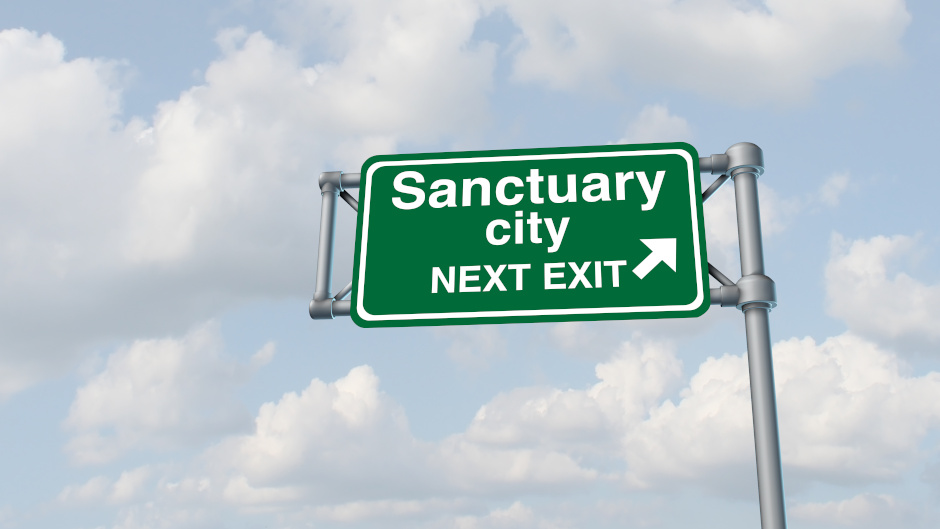Miami Law's commitment to immigration law and human rights law is center stage. A federal court ruled recently that key sections of Florida’s anti-sanctuary law violate the Equal Protection Clause of the U.S. Constitution, delivering a decision that strikes a major blow to the state’s anti-immigrant policymakers and a decisive victory for communities who fought to defeat the law beginning in 2019.
In 2019, Miami Law's Immigration Clinic partnered with Southern Poverty Law Center and the Community Justice Project to ask U.S. District Judge Beth Bloom for a preliminary injunction against the bill. The Florida law purported to require local officials to use their “best efforts” to help enforce federal immigration law and prohibit local governments from adopting sanctuary policies. “The law is unlawful, runs contrary to our community values, and hurts Florida’s most vulnerable,” according to Rebecca Sharpless, director of the clinic. “Judge Bloom’s decision is a testament to the enduring importance of our Constitution and its prohibition against laws enacted with a discriminatory purpose.”
Advocates proved that the law, known as S.B. 168, undermines public safety and increases racial profiling, and that it was designed with the consultation of anti-immigrant hate groups.
In the ruling, Judge Beth Bloom wrote, “[T]he Sanctuary Prohibition was enacted based on biased and unreliable data generated by anti-immigrant hate groups FAIR and CIS, despite the chilling effect and disparate impact that this provision would have on immigrant communities. Moreover, the Best Efforts Provision anticipated and intended to grant law enforcement officers expansive discretion on when and how to use their ‘best efforts,’ despite the knowledge that such proactive policing measures were likely to increase the amount of racial profiling that occurs during law enforcement interactions.”
In response to the judge’s 110-page decision, the coalition released the following joint statement:
“This ruling is a victory for immigrants across the state of Florida. This law was clearly developed to encourage racial profiling, civil rights violations, isolation of immigrant communities, and unjust deportations. It did more harm for the causes of public safety than good. This should send a clear message to Gov. DeSantis and all those proponents of this racist law that they will not go unchallenged.”
The lawsuit was filed on behalf of nine organizations, including Florida Immigrant Coalition, Farmworker Association of Florida, WeCount!, Americans for Immigrant Justice, Hope Community Center, QLatinx, Westminster Presbyterian United Church, The Guatemalan-Maya Center, Inc., Family Action Network Movement and the City of South Miami.
In 2019, the Florida Legislature passed SB 168, a law requiring local law enforcement agencies to use their “best efforts” to comply with the enforcement of federal immigration law. SB 168 also prohibited localities from adopting sanctuary policies. The Plaintiffs challenged SB 168, asserting the law violates the Equal Protection Clause of the U.S. Constitution. Both the “best efforts” provision and the prohibition against sanctuary cities were struck down with Judge Bloom’s ruling.
Clinics and law students collaborate
Miami Law’s Human Rights Clinic, with a coalition of organizations, filed an amicus brief in the case.
"The amicus brief is one of many examples of the multidimensional lawyering that Miami Law Human Rights Clinic students are spearheading at the local, national, and global levels,” said Caroline Bettinger-López, director of the clinic. “To highlight the human rights violations spurred by anti-immigrant laws like SB 168, my students and I wrote an op-ed for the Miami Herald, submitted a report to the United Nations Human Rights Council, co-authored an article in the Harvard Latinx Law Review, and filed this federal court brief in support of immigrant survivors in Florida. By touching different audiences, we hope we can make a difference, and bring human rights home to Florida.”
The complaint, City of South Miami, et al. v. DeSantis, et al., was filed in U.S. District Court for the Southern District of Florida, Miami Division.
The court’s order can be found here: https://www.splcenter.org/sites/default/files/de_201-_order_sb_168_trial.pdf
Read more about Miami Law's clinics

